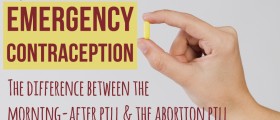Today, with modern medical advancements, women can successfully evade unwanted pregnancy, even after an unprotected sexual intercourse has taken place. Basically, there are special medications made for these purposes, called emergency contraceptive pills, which can be taken within 72 hours after the unprotected intercourse. Most of these pills contain either estrogen or progesterone, or progesterone alone, preventing ovulation and, thus, stopping pregnancy as well.
Fact to Know before Taking the Pill
First of all, the sooner you take the pill, the better. Basically, these pills are most effective during the first 24 hours after the unprotected sex.
However, most of these pills, like Plan B, for example, come in pairs of two pills, which you should take either together or twelve hours apart. Note that any form of emergency contraception cannot match regular birth control pills, when it comes to efficiency and prevention of pregnancy. Also, keep in mind that these pills cannot protect you from any form of sexually transmitted diseases such as AIDS, gonorrhea, chlamydia etc.

Taking the Pill before the Intercourse
The emergency contraceptive pills are equally effective when taken immediately before the sexual intercourse. Thus, the name “ the morning after pill” is not quite appropriate for these medications.
However, before you take any of these pills, you are advised to consult your doctor. Additionally, some types of emergency contraceptive pills are issued only with prescription. On the other hand, some can be purchased over-the-counter, for persons older than 17.
- We searched until 1 September 2014 for trials that tested repeated pre- and postcoital use of hormonal drugs for pregnancy prevention. Databases included CENTRAL, MEDLINE, and POPLINE. We searched for current trials via ClinicalTrials.gov and ICTRP. For the initial review, we also searched EMBASE, CINAHL, and LILACS, and wrote to researchers to identify other trials.
- Two authors independently confirmed eligibility and extracted data from the included studies. We calculated confidence intervals (CI) around individual study Pearl indices using a Poisson distribution. We presented individual study estimates and pooled estimates and their 95% CI, where appropriate.
- We found 22 trials that evaluated pericoital use of LNG and other hormonal drugs on a regular basis to prevent pregnancy. The studies included a total of 12,400 participants, and were conducted in Europe, Asia, and the Americas. The drugs and doses evaluated included levonorgestrel (LNG) 0.75 mg (11 studies), LNG in doses other than 0.75 mg (4 trials), and hormones other than LNG (7 trials). Outcomes included pregnancy rates, discontinuation, side effects, and acceptability.
- Pericoital levonorgestrel was reasonably efficacious and safe. The pooled Pearl Index for the 0.75 mg dose of LNG was 5.4 per 100 woman-years (95% CI 4.1 to 7.0). The pooled Pearl Index for all doses of LNG was 5.0 per 100 woman-years (95% CI 4.4 to 5.6). Other hormonal drugs appeared promising but most of them were not studied extensively. Menstrual irregularities were the most common side effects reported. However, the studies provided no consistent evidence of a relationship between bleeding abnormalities and either frequency of pill intake or total dose of the drug. Non-menstrual side effects were reportedly mild and not tabulated in most studies. Most women liked the pericoital method in spite of frequent menstrual irregularities.
Speaking of the effectiveness of these pills, they can successfully prevent pregnancy in about 89% of cases. Yet, in order for them to be fully effective, you must take the pills properly and on time, following all the instructions carefully.
Again, regular birth control pills are a better choice since this variant offers adequate protection without any unwanted side-effects. As for adverse effects, emergency contraceptive pills can cause many, including nausea, stomach pain, dizziness, diarrhea, headache, vomiting, breast tenderness and shifts of the menstrual cycle, among other symptoms. Fortunately, most of the side-effects are temporary and harmless, disappearing within 24 hours.
Finally, there are no definite means of finding out whether emergency contraceptive pills have prevented your pregnancy or not. Rather, you can keep track of your menstrual period and seek medical advice if your period is late for more than a week. In this case, there are great chances that you might be pregnant after all. Do not use Plan B or other emergency contraceptive pills if you are already pregnant or if you experience vaginal bleeding or any signs of allergic reactions to these types of medications.

















Your thoughts on this
Loading...